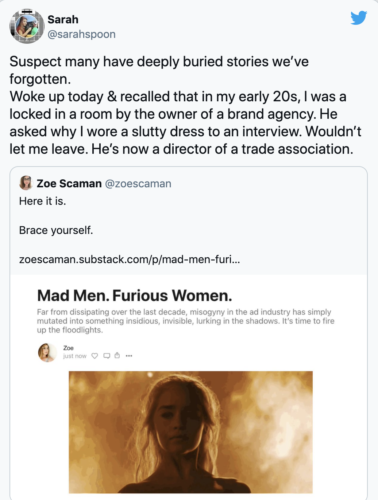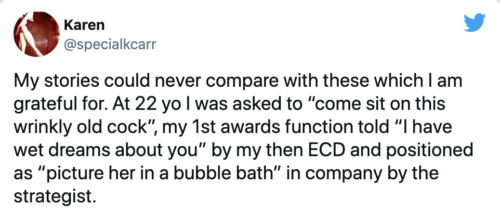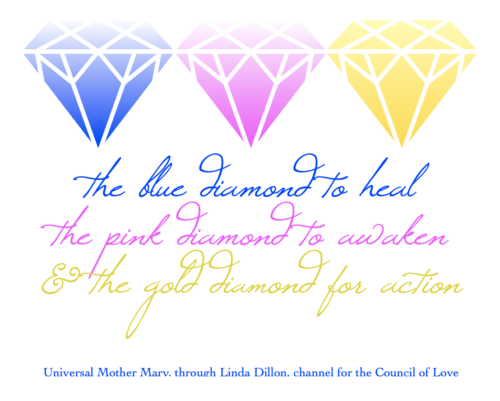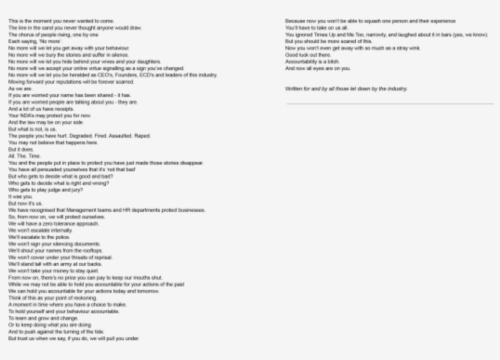
Hundreds of women have shared horror stories, after brand strategist Zoe Scaman penned a letter exposing the sexual harassment and mistreatment she has endured in her two decades in the ad industry.
By Jeff Beer, Fast Company, July 7, 2021
“Musings of a Wandering Mind”
Twelve years ago, advertising and brand strategist Zoe Scaman was sexually assaulted by her boss after he followed her into a washroom stall on a work night out.
The next morning, while sitting six feet away, he sent her an email suggesting she “forget about last night,” because he had a wife and kids, as if what happened was either consensual or mutual.
It was neither.
Scaman told a few people about it, but the general response was that she shouldn’t “kick up a fuss” because “it wasn’t worth it.”
That same man went on to become a client at her next agency job, where she’d often hide and cry when he was in the building.
This is just one incident of many over the course of her career that Scaman details in a new essay.
The founder of UK strategy studio Bodacious, has built a following on Twitter around her insights on consumer culture and brand strategy, and a resume that includes global advertising names like Droga5 and Universal McCann, as well as work on major brands like Adidas and Nike.
On Sunday, she published the piece on her “Musings of a Wandering Mind” newsletter that has caused the ad industry to really sit up and take notice.
“Mad Men. Furious Women.” begins by chronicling a few of the incidents of sexual harassment, bullying, and gaslighting she has experienced over her 18-year career:
“When I was 18, I got my first job in an ad agency.
“When I was 19, I was sexually assaulted by a client in an alleyway outside of my first big industry party. When he was done, he told me to stop being so hysterical. Out of fear and shame, I stayed silent.
“When I was 20, I was hired by another ad agency. After I’d finished the interview, I heard the man who’d offered me the job go out into the office and say ‘hired a hot one, something decent to look at’, before they all started laughing.
“When I was 24 I was sexually assaulted by a boss after he followed me into a toilet cubicle on a night out.
“The next morning, whilst sitting two metres away from me, he sent me an email to suggest we ‘forget about last night’ because he had a wife and kids, as if what had occurred was either consensual or mutual.
“It was neither. I told a few people but it was recommended that I not ‘kick up a fuss’ because ‘it wasn’t worth it’.
“That man went on to become a client at my next agency; I’d often hide and cry when he was in the building.
When I was 26. . .
The essay also includes a number of anonymous accounts from others.
It paints a picture of an industry that sees itself as progressive and innovative, but still has a long way to go when it comes to the treatment of women in its ranks.
“We like to believe that misogyny and the mistreatment of women is a thing of the past, it is not,” she writes.
“Instead it has morphed and evolved into something insidious; no longer overt and no longer a common occurrence carried out in public for all to see.
“Instead it’s moved behind the curtain where it operates in the shadows, in private messages, in whispered comments and in the deeply disturbing behaviour [SIC] many of us experience individually, quietly, and about which, due to fear of reproach or reprisal, we rarely share openly.”
The idea for the piece came out of a conversation with a fellow ad strategist she had just met, who made the move to London from New York.
“Within a few minutes we were warning each other about who to avoid in the different markets, and sharing horror stories,” Scaman tells Fast Company.
“At one point we both sat there and said,
‘Hold on a second, what are we doing?’
“We were shocked at that behavior, but it’s become so normalized for women, not just in advertising but most industries.
“I just found myself incensed that this had become normalized to the point where we didn’t question the fact we’re warning other women how to stay safe in their workplace.”
“Diet Madison Avenue”
In late 2017, around the same time Hollywood was in the midst of its MeToo reckoning with allegations against Louis CK and Ashley Judd’s accusations against Harvey Weinstein, an anonymous Instagram account called Diet Madison Avenue began sharing accusations of sexual harassment and mistreatment in the ad industry.
Diet Madison Avenue named names and called out executives who had recently been fired from major agencies.
Former chief creative officer at The Martin Agency Joe Alexander sued both Diet Madison Avenue and his former employer, after he was fired following multiple sexual harassment complaints.
The former suit was dismissed in 2020. Amid several other defamation suits, Diet Madison Avenue shut down its social accounts and website in May 2018.
Needed Change
Scaman sees these incidents as just the tip of the iceberg.
The ad industry was long known as a fun time boys club, one that closely reflected the grab-ass banter and darker undertones of the fictional hit TV show Mad Men. That sexism was apparent in the work.
Taglines like:
“Is it always illegal to kill a woman?”
And “Keep her where she belongs” were common in the 1960s, but still held a grip well into the 21st century.
In more recent years, many brands and advertisers have begun to use the language of empowerment in their pitches, giving a false impression that misogyny, gender pay gaps, and other sexist behavior are relics of the past.
In the last two days, Scaman has received hundreds of stories from women around the world, detailing their own traumatic experiences.
Many others have taken to Twitter to retweet the newsletter and share stories.



Breaking the Culture of Silence
“Nothing really happened after MeToo, a couple of heads rolled, but it was symbolic,” Scaman says.
“No real policy changes were enacted. There were a lot of pledges, a lot of heartfelt open letters, conference panels, but nothing has really changed. I don’t think the men who have done stuff already are going to be held to account. I think they’ve gotten away with it.”
She hopes that by speaking out, she can help effect change that will move the industry forward.
She’s encouraged by more stories being shared, and names being named, on industry message apps like Fishbowl.
“Right now there is a culture of silence, fear, and shame that we need to break,” she says.
Case in point:
The call to name more names has actually been going on for years. Former advertising executive and Make Love Not Porn founder Cindy Gallop addressed this need in a 2017 industry conference keynote.
Abolishing NDA’s & Victim Services
Outside of more women sharing their stories, Scaman says two major things need to happen.
The first is that companies need to get rid of non-disclosure agreements.
NDAs are legally binding documents many employers ask employees to sign when they take a job.
They are essentially designed to prevent people from speaking out.
Other female industry leaders, like Katherine Gordon, CEO of the 3% Movement, have also called for a ban on NDAs.
Second, an independent organizations needs to be established on behalf of victims.
Human Resources departments exist to protect companies not people, and can’t be fully trusted.
A Call To Arms
On Tuesday, Scaman and a group of industry colleagues created A Call to Arms, warning past and would-be perpetrators that their behavior will no longer be tolerated.
It reads:
Scaman has never pressed charges or sought official accountability from any of her past harassers.
Since her essay was published and widely circulated, one of the men who harassed her emailed her.
Her whole body went white hot, and she felt lightheaded and nauseous.
“That is a fear and trauma response, still strong, years and years and years later,” she wrote on Twitter:
“This is what it does to us.”
For those looking to contribute and help make the changes needed in the ad industry, Scaman suggests getting in touch with and helping organizations that work to support women in the ad industry, like The 3% Conference , Creative Equals, TimeTo, and Women in Advertising and Communications, Leadership (WACL).
If you have experienced workplace abuse and would like to share your story, I will honor your anonymity.
You can email me here or DM me on Twitter here.
Jeff Beer, Fast Company, July 7, 2021




